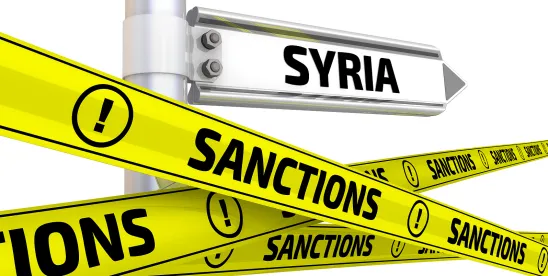What Happened
On June 30, 2025, President Trump issued an Executive Order (Syria EO) that revoked prior executive orders that placed comprehensive sanctions on Syria. In addition, the Syria EO takes steps to ease export controls on Syria but maintains sanctions imposed on individuals and entities associated with former Syrian president Bashar al-Assad and others linked to terrorist organizations.
The Bottom Line
Effective July 1, 2025, the Syria EO effectively marks the end of one of the US Department of Treasury Office of Foreign Assets Control’s (OFAC) comprehensive sanctions programs. The Syria EO also eases export controls restrictions on Syria. Investors and businesses considering new opportunities to enter Syria should carefully consider the impact and limits of the Syria EO, as well as persistent sanctions risks in the region.
Full Story
On May 23, 2025, OFAC issued Syria General License 25 (GL 25), which broadly authorized financial transactions previously prohibited under the Syrian Sanctions Regulations, following earlier announcements from President Trump that the United States would lift sanctions on Syria. Our prior coverage of GL 25 is available here.
The Syria EO revoked six prior executive orders that formed the basis for the Syria Sanctions Regulations, effectively terminating comprehensive sanctions on Syria. Concurrent with the Syria EO, OFAC removed 518 individuals and entities from its List of Specially Designated Nationals and Blocked Persons (SDN List) sanctioned under the Syria sanctions program.
As described in OFAC’s press release regarding its implementation of the Syria EO, “[t]he circumstances that gave rise to OFAC’s Syria sanctions program, related to the brutal former regime of Bashar al-Assad, have been transformed by developments over the past six months, including the positive actions taken by the new Syrian government under President Ahmed al-Sharaa.… To support the people of Syria and their new government as they rebuild their country after many years of destruction caused by the former regime of Bashar al-Assad, OFAC is implementing the President’s termination of the Syria sanctions program. As a result, OFAC is removing individuals and entities blocked solely under the Syria sanctions program from the SDN List. Accordingly, all property and interests in property of such individuals and entities will be unblocked. In addition, OFAC will remove the Syrian Sanctions Regulations from the Code of Federal Regulations.” Concurrent with the Syria EO, OFAC issued FAQs 1220-1223 regarding the termination of the Syria sanctions program.
As noted in our prior coverage of GL 25, certain sanctions on Syria are imposed by statute and require Congressional action to effect the termination called for in the Syria EO. Accordingly, the Syria EO directs the US Secretary of State, in consultation with the US Secretary of the Treasury, to examine whether to suspend, in whole or in part, sanctions otherwise required under the Caesar Act. The Caesar Act permits limited suspension of sanctions imposed under the statute, and the action directed by the Syria EO appears to set the stage for recommendations to Congress with respect to these sanctions. The Syria EO also calls for the US Secretary of State to waive certain export controls on Syria imposed under the Syria Accountability Act and the Chemical and Biological Weapons Control and Warfare Elimination Act and to report the same to the appropriate congressional committees.
In addition to the steps described above, the Syria EO directs the US Secretary of State to review Syria’s designation as a State Sponsor of Terrorism. Pending the outcome of that review, the designation could be lifted, which would change export control licensing requirements with respect to Syria. The Syria EO also directs the US Secretary of State to support avenues at the United Nations with respect to sanctions relief in support of the objectives outlined in the Syria EO.
Investors and businesses considering doing business in Syria should carefully consider the scope of the Syria EO as well as persistent sanctions risks in the region. Specifically, a large number of sanctioned individuals and entities remain in Syria, designated by OFAC on the basis of links to Iran, Russia, and the former regime of Bashar al-Assad or terrorist organizations that remain sanctioned under the Syria EO. The comprehensive sanctions previously imposed on Syria have resulted in the development of an economy linked to other comprehensively sanctioned countries and sanctioned persons, and sanctions risks will remain elevated during the easing of sanctions on Syria. In addition, the limits of the Syria EO warrant careful consideration as the full scope of changes to export control licensing requirements with respect to Syria remain subject to the steps directed in the Syria EO. Finally, the Syria EO states that the United States “is committed to supporting a Syria that is stable, unified, and at peace with itself and its neighbors. A united Syria that does not offer a safe haven for terrorist organizations and ensures the security of its religious and ethnic minorities will support regional security and prosperity.” This background illustrates that US support for Syria’s new government remains conditioned on its alignment with key priorities for counterterrorism, regional stability, and peace.
The Syria EO’s lifting of comprehensive sanctions on Syria will impact established practices with respect to sanctions screening and deal diligence, as well as existing covenants in financing and other agreements, that may impose blanket restrictions on all business dealings in or involving Syria. For example, it has been standard practice for companies and financial institutions to specifically list Syria as a comprehensively sanctioned country in financing and other agreements and to avoid business dealings in the country as a matter of policy. Companies should carefully consider changes to compliance programs, balancing the sanctions risks that persist in Syria described above with new opportunities for doing business in the country in the wake of the Syria EO.





 />i
/>i
